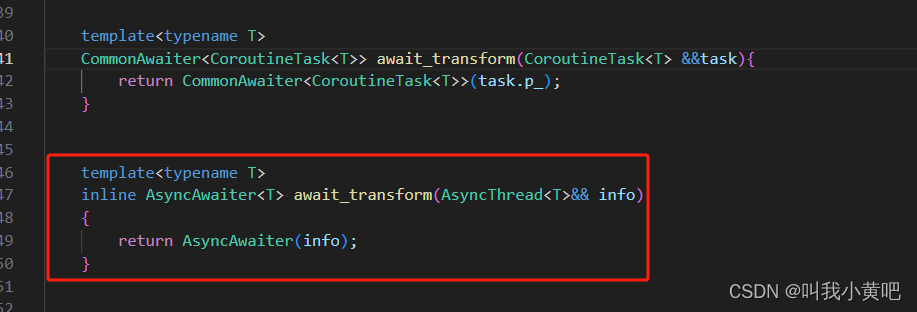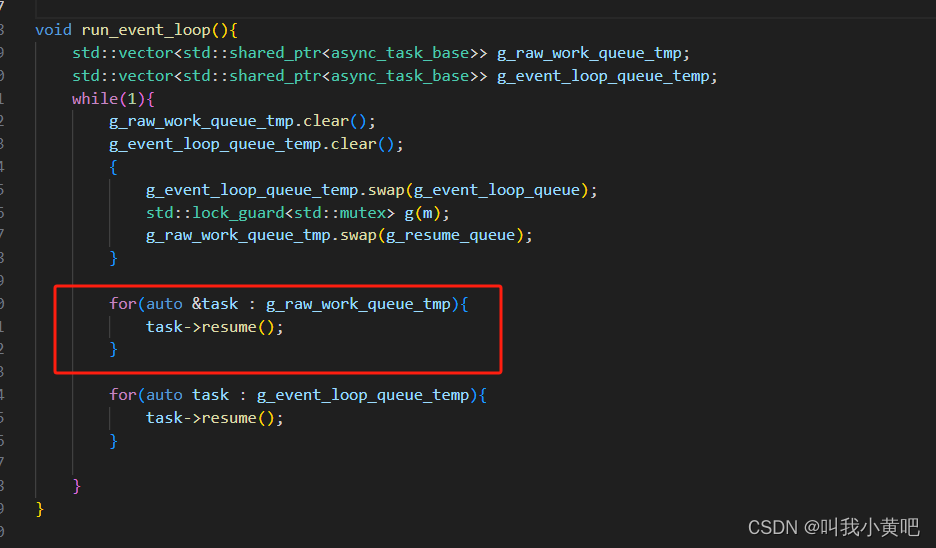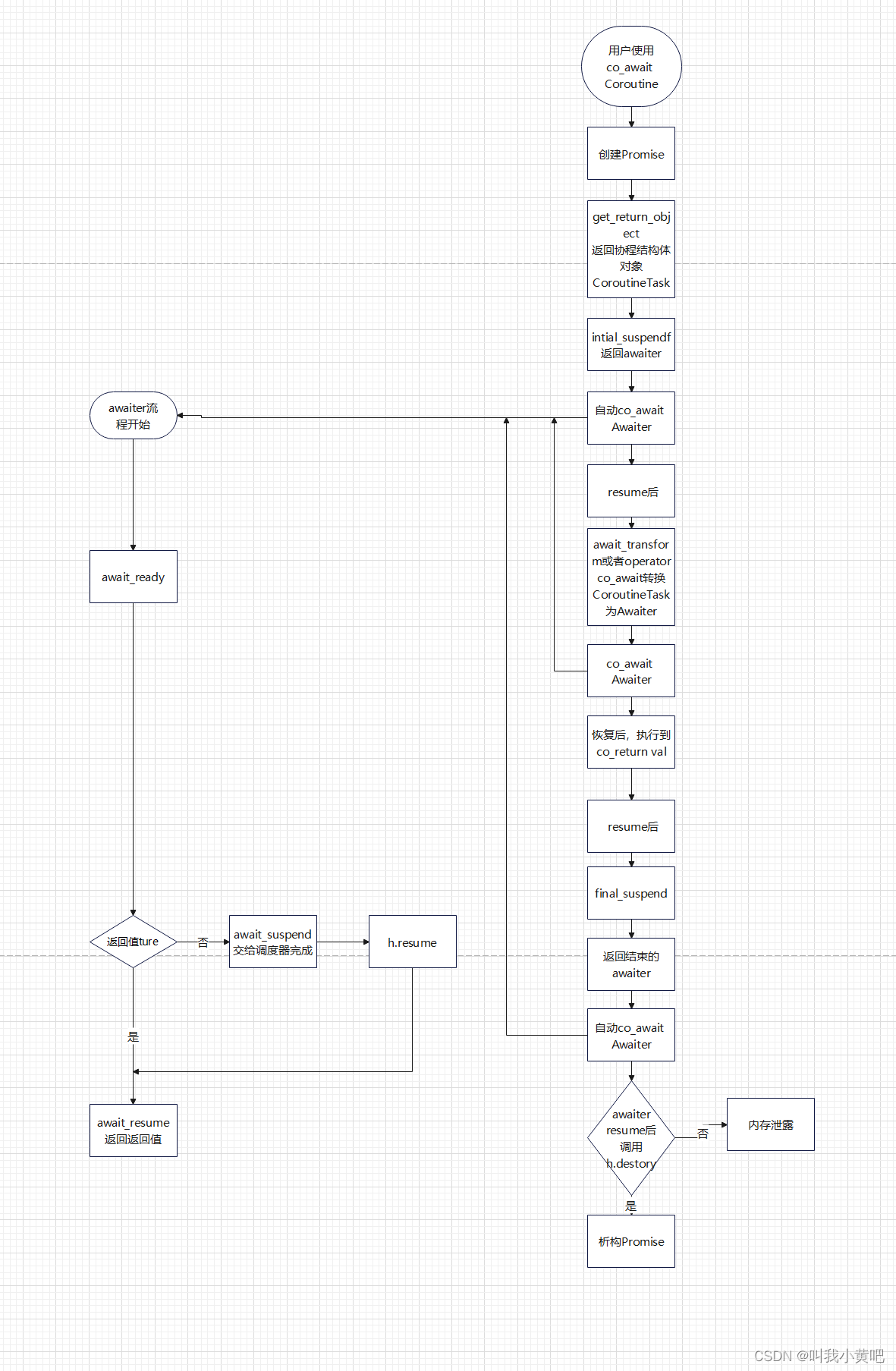objective-c-c++20协程详解(四)
推荐 原创前言
到这就是协程的最后一节了。希望能帮到大家
代码
到这里我们整合下之前二、三节的代码
#include <coroutine>
#include <functional>
#include <chrono>
#include <iostream>
#include <thread>
#include <mutex>
#include <memory>
#include <vector>
struct async_task_base
{
virtual void completed() = 0;
virtual void resume() = 0;
};
std::mutex m;
std::vector<std::shared_ptr<async_task_base>> g_event_loop_queue;
std::vector<std::shared_ptr<async_task_base>> g_resume_queue; //多线程异步任务完成后后,待主线程恢复的线程
std::vector<std::shared_ptr<async_task_base>> g_work_queue; //执行耗时操作线程队列
enum class EnumAwaiterType:uint32_t{
EnumInitial = 1, //协程initial
EnumSchduling = 2,// 用户co_await
EnumFinal = 3//销毁
};
template <typename ReturnType>
struct CoroutineTask;
template <typename CoTask, EnumAwaiterType AwaiterType >
struct CommonAwaiter ;
template <typename>
struct AsyncAwaiter;
template <typename ReturnType>
struct AsyncThread
{
using return_type = ReturnType;
AsyncThread(std::function<return_type ()>&& func): func_(func){
}
std::function<return_type ()> func_;
};
template <typename ReturnType>
struct async_task: public async_task_base{
async_task(AsyncAwaiter<ReturnType> &awaiter)
:owner_(awaiter)
{
}
void completed() override{
ReturnType result = owner_.func_();
owner_.value_ = result;
}
void resume() override{
owner_.h_.resume();
}
AsyncAwaiter<ReturnType> &owner_ ;
};
template <typename ReturnType>
struct AsyncAwaiter
{
using return_type = ReturnType;
AsyncAwaiter(AsyncThread<ReturnType>& info){
// std::cout<< " AsyncAwaiter(AsyncThread<ReturnType>& info)" << std::endl;
value_ = return_type{};
func_ = info.func_;
}
bool await_ready() const noexcept {
return false;
}
void await_suspend(std::coroutine_handle<> h) {
h_ = h;
std::lock_guard<std::mutex> g(m);
g_work_queue.emplace_back(std::shared_ptr<async_task_base>( new async_task<uint64_t>(*this)));
}
return_type await_resume() const noexcept {
return value_;
}
std::function<return_type ()> func_;
std::coroutine_handle<> h_;
return_type value_ = return_type();
};
template <typename CoTask, EnumAwaiterType AwaiterType>
struct coroutine_task: public async_task_base{
coroutine_task(CommonAwaiter<CoTask, AwaiterType> &awaiter)
:owner_(awaiter)
{
}
void completed() override{
}
void resume() override{
if(owner_.h_.done()){
owner_.h_.destroy();
}else{
owner_.h_.resume();
}
}
CommonAwaiter<CoTask,AwaiterType> &owner_ ;
};
template <typename CoTask, EnumAwaiterType AwaiterType = EnumAwaiterType::EnumSchduling>
struct CommonAwaiter
{
using return_type = typename CoTask::return_type;
using promise_type = typename CoTask::promise_type;
CommonAwaiter(promise_type* promise):promise_(promise){
}
bool await_ready() const noexcept {
return false;
}
//也可以直接恢复
// std::coroutine_handle<> await_suspend(std::coroutine_handle<> h) {
// return h;
// }
void await_suspend(std::coroutine_handle<> h) {
h_ = h;
g_event_loop_queue.emplace_back(std::shared_ptr<async_task_base>( new coroutine_task<CoTask, AwaiterType>(*this)) );
}
return_type await_resume() const noexcept {
return promise_->get_value();
}
~CommonAwaiter(){
}
bool resume_ready_= false;
promise_type* promise_ = nullptr;
std::coroutine_handle<> h_ = nullptr;
};
template <typename CoTask>
struct CommonAwaiter<CoTask, EnumAwaiterType::EnumInitial>
{
CommonAwaiter(){
}
bool await_ready() const noexcept {
return true;
}
void await_suspend(std::coroutine_handle<>) {
}
void await_resume() const noexcept {
}
~CommonAwaiter(){
}
};
template <typename CoTask>
struct CommonAwaiter <CoTask, EnumAwaiterType::EnumFinal>
{
CommonAwaiter(){
}
bool await_ready() noexcept {
return false;
}
void await_suspend(std::coroutine_handle<> h) noexcept{
h_ = h;
g_event_loop_queue.emplace_back(std::shared_ptr<async_task_base>( new coroutine_task<CoTask, EnumAwaiterType::EnumFinal>(*this)));
}
void await_resume() noexcept{
}
std::coroutine_handle<> h_ = nullptr;
};
template<typename CoTask>
struct Promise
{
using return_type = typename CoTask::return_type ;
~Promise(){
}
CommonAwaiter<CoTask, EnumAwaiterType::EnumInitial> initial_suspend() {
return {};
};
CommonAwaiter<CoTask, EnumAwaiterType::EnumFinal> final_suspend() noexcept {
return {};
}
void unhandled_exception(){
std::rethrow_exception(std::current_exception());
}
CoTask get_return_object(){
return CoTask(this);
}
return_type get_value() {
return value_;
}
void return_value(return_type value){
value_ = value;
}
template<typename T>
CommonAwaiter<CoroutineTask<T>> await_transform(CoroutineTask<T> &&task){
return CommonAwaiter<CoroutineTask<T>>(task.p_);
}
template<typename T>
inline AsyncAwaiter<T> await_transform(AsyncThread<T>&& info)
{
return AsyncAwaiter(info);
}
return_type value_;
};
template <typename ReturnType>
struct CoroutineTask{
using return_type = ReturnType;
using promise_type = Promise<CoroutineTask>;
CoroutineTask(const CoroutineTask &other) = delete;
CoroutineTask(const CoroutineTask &&other) = delete;
CoroutineTask& operator=(const CoroutineTask&) {};
CoroutineTask& operator=(const CoroutineTask&&) = delete;
CoroutineTask(promise_type* promise) {
p_ = promise;
}
promise_type *p_ = nullptr;
};
void do_work() {
while (1)
{
std::lock_guard<std::mutex> g(m);
for(auto task : g_work_queue){
task->completed();
g_resume_queue.push_back(task);
}
g_work_queue.clear();
}
}
void run_event_loop(){
std::vector<std::shared_ptr<async_task_base>> g_raw_work_queue_tmp;
std::vector<std::shared_ptr<async_task_base>> g_event_loop_queue_temp;
while(1){
g_raw_work_queue_tmp.clear();
g_event_loop_queue_temp.clear();
{
g_event_loop_queue_temp.swap(g_event_loop_queue);
std::lock_guard<std::mutex> g(m);
g_raw_work_queue_tmp.swap(g_resume_queue);
}
for(auto &task : g_raw_work_queue_tmp){
task->resume();
}
for(auto task : g_event_loop_queue_temp){
task->resume();
}
}
}
// ------------------------------------------------------------------------------------------------------
template <typename ReturnType>
AsyncThread<ReturnType> do_slow_work(std::function< ReturnType () > &&func){
return AsyncThread<ReturnType>(std::forward< std::function< ReturnType () > >(func));
}
CoroutineTask<u_int64_t> second_coroutine(){
co_return 3;
}
CoroutineTask<float> third_coroutine(){
co_return 3.1;
}
CoroutineTask<char> first_coroutine(){
int a = 1;
auto func =[&]() -> uint64_t{
// std::cout<< "do a slow work !!!!!!!!!!!!!!!!!!!!!" << std::endl;
return a;
};
uint64_t result = co_await do_slow_work<uint64_t>(func);
std::cout << "@@@@@@@@@ result1 is : " << result << std::endl;
a = 2;
result = co_await do_slow_work<uint64_t>(func);
std::cout << "@@@@@@@@@ result2 is : " << result << std::endl;
uint64_t num = co_await second_coroutine();
std::cout << "@@@@@@@@@ second_coroutine result is : " << num << std::endl;
a = 3;
result = co_await do_slow_work<uint64_t>(func);
std::cout << "@@@@@@@@@ result3 is : " << result << std::endl;
float num2 = co_await third_coroutine();
a = 4;
result = co_await do_slow_work<uint64_t>(func);
std::cout << "@@@@@@@@@ third_coroutine result is : " << num2 << std::endl;
result = co_await do_slow_work<uint64_t>(func);
std::cout << "@@@@@@@@@ result4 is : " << result << std::endl;
co_return 'b';
}
CoroutineTask<char> Coroutine(){
int a = 1;
auto func =[&]() -> uint64_t{
// std::cout<< "do a slow work !!!!!!!!!!!!!!!!!!!!!" << std::endl;
return a;
};
uint64_t result = co_await do_slow_work<uint64_t>(func);
std::cout << "@@@@@@@@@ result is : " << result << std::endl;
uint64_t num = co_await second_coroutine();
std::cout << "@@@@@@@@@ coroutine result is : " << num << std::endl;
co_return 'b';
}
void test_func(){
Coroutine();
first_coroutine();
}
int main(){
test_func();
std::thread work_thread(do_work);
run_event_loop();
return 0;
}
分析
将对两种awaiter的co_await操作规则定义到promise中

对co_await可以使用await_transform 和重载co_await运算符,但是两种用法不能同时存在。

优先恢复其他线程完成耗时任务的协程,再进行当前线程中的协程挂起、销毁、恢复调度。
协程函数相对对于协程的优势
协程每次都会在final_suspend和initial_suspend时创建awaiter,以及对awaiter挂起,在for循环中,这样显然不科学,但异步函数只有一个awaiter,在for循环中更合适。
运行结果

待扩展
异步io
如果对使用epoll实现网络io异步函数感兴趣,可以自行实现,实现方式和实现多线程异步函数一样,这里就不实现了,注意下epoll中,不能添加普通文件系统fd。
协程超时机制
可以加上定时器对async_task_base进行超时检查,以此来支持协程超时
流程图
最后附上co_await Coroutine()的流程图

更多【objective-c-c++20协程详解(四)】相关视频教程:www.yxfzedu.com
相关文章推荐
- hive-项目实战:抽取中央控制器 DispatcherServlet - 其他
- kafka-Kafka(消息队列)--简介 - 其他
- github-github 上传代码报错 fatal: Authentication failed for ‘xxxxxx‘ - 其他
- matlab-【MATLAB源码-第69期】基于matlab的LDPC码,turbo码,卷积码误码率对比,码率均为1/3,BPSK调制。 - 其他
- 爬虫-Python 爬虫基础 - 其他
- ui-Qt6,使用 UI 界面完成命令执行自动化的设计 - 其他
- 物联网-基于STM32的设计智慧超市管理系统(带收银系统+物联网环境监测) - 其他
- python-【Python基础】 Python设计模式之单例模式介绍 - 其他
- 物联网-物联网对接协议 - 其他
- 安全-远程运维用什么软件?可以保障更安全? - 其他
- 阿里云-STM32G0+EMW3080+阿里云飞燕平台实现单片机WiFi智能联网功能(三)STM32G0控制EMW3080实现IoT功能 - 其他
- 前端框架-vue项目中页面遇到404报错 - 其他
- 安全-vivo 网络端口安全建设技术实践 - 其他
- 前端框架-前端框架Vue学习 ——(五)前端工程化Vue-cli脚手架 - 其他
- 物联网-ZZ038 物联网应用与服务赛题第D套 - 其他
- 爬虫-网络爬虫的实战项目:使用JavaScript和Axios爬取Reddit视频并进行数据分析 - 其他
- c语言-ZZ038 物联网应用与服务赛题第C套 - 其他
- c语言-cordova Xcode打包ios以及发布流程(ionic3适用) - 其他
- 物联网-Xcode15 framework ‘CoreAudioTypes‘ not found - 其他
- 科技-打造高效运营底座,极智嘉一体化软件系统彰显科技威能 - 其他
记录自己的技术轨迹
文章规则:
1):文章标题请尽量与文章内容相符
2):严禁色情、血腥、暴力
3):严禁发布任何形式的广告贴
4):严禁发表关于中国的政治类话题
5):严格遵守中国互联网法律法规
6):有侵权,疑问可发邮件至service@yxfzedu.com
近期原创 更多
- fpga开发-「Verilog学习笔记」多功能数据处理器
- 前端-TypeScript深度剖析:TypeScript 中枚举类型应用场景?
- java-Failure to find org.apache.maven.plugins:maven-resources- plugin:jar:3.8.1
- 机器学习-Azure - 机器学习:使用自动化机器学习训练计算机视觉模型的数据架构
- 网络-网络运维Day01
- 机器学习-Azure 机器学习 - 设置 AutoML 训练时序预测模型
- java-10-27 maven概念
- java-Maven的总结
- 学习-【Azure 架构师学习笔记】-Azure Storage Account(5)- Data Lake layers
- 人工智能-高校为什么需要大数据挖掘平台?
